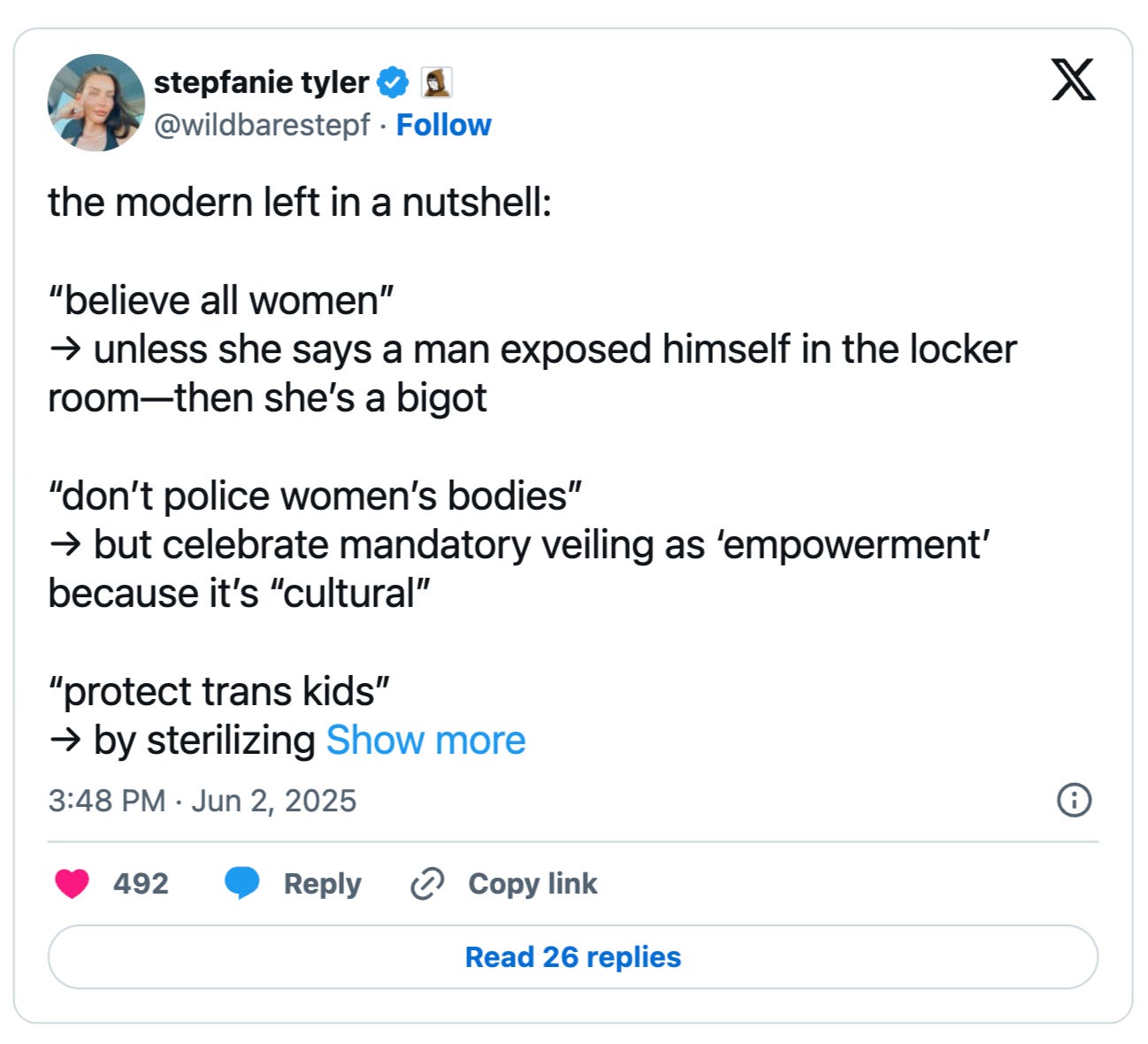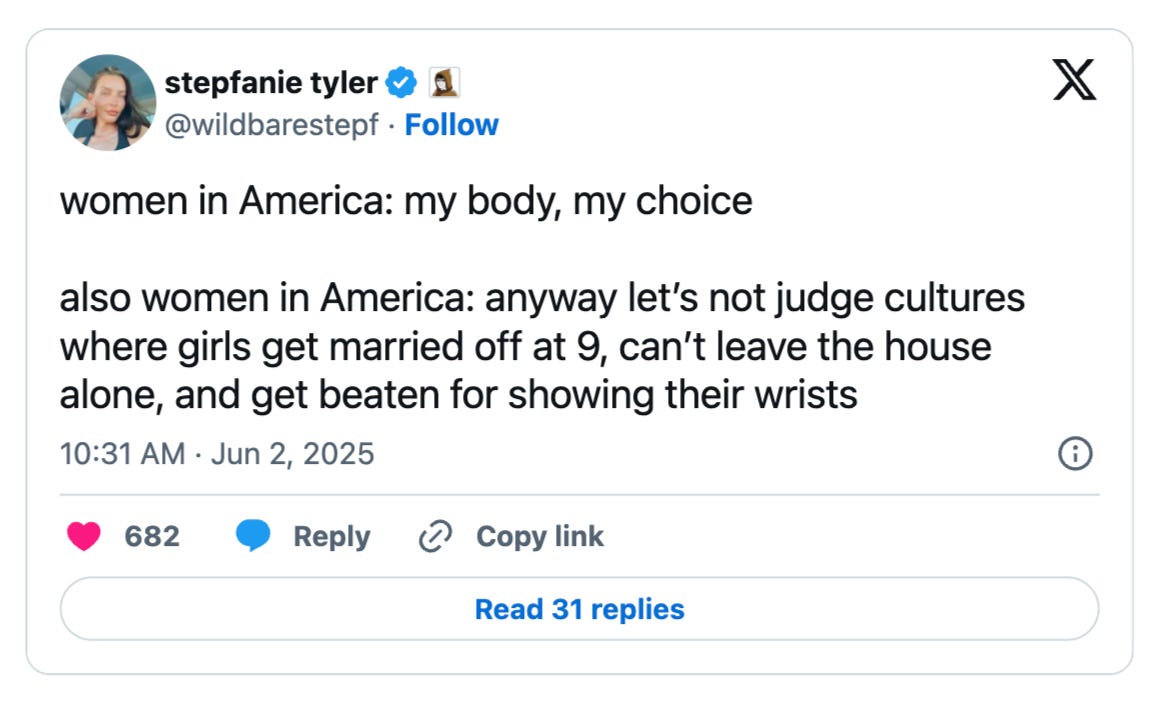the cult of contradiction: a field guide to modern leftist logic
Yesterday, I fired off a quick post on 𝕏 summarizing what I saw as some of the modern Left’s most glaring contradictions. I ended up thinking about it the rest of the day and figured this wasn’t just snark. It was a thread worth pulling.
Because when you actually examine these slogans—“believe all women,” “don’t police women’s bodies,” “protect trans kids”, etc.—they don’t hold up. Not consistently. Not logically. What you find beneath them isn’t clarity, but selective outrage and manufactured consensus. A framework that only works when no one asks questions.
So that’s what I did.
Quick heads up: this post is pretty lengthy and too long for email, so you might want to switch to read on the app :)
“Believe all women”→ Unless she says a man exposed himself in the locker room—then she’s a bigot
“Believe all women” was never a neutral slogan. It was a blunt weapon, born from the ashes of Harvey Weinstein and welded into cultural policy by #MeToo. It didn’t mean “listen to women,” or “take accusations seriously”—both reasonable ideals. It meant “believe without question.” The presumption of innocence? A patriarchal tool. Due process? An outdated obstacle to justice. The left turned “believe all women” into a doctrine that rejected inquiry and crowned emotion as king. But this moral absolutism fractured the moment it collided with another of their sacred pillars: gender ideology.
In 2021, a woman at Wi Spa in Los Angeles reported that a fully intact biological male had exposed himself in the women’s locker room. The expected cultural response—empathy, advocacy, maybe a GoFundMe—never arrived. Instead, the woman was branded a bigot on social media. Protesters showed up on behalf of the man, waving trans pride flags and screaming “trans women are women!” on the spa steps. Leftist media outlets framed the story as manufactured right-wing hysteria.
This is the left’s new standard: “Believe all women”—unless her experience threatens the narrative. Unless she says something they don’t like. Unless she sees something she wasn’t supposed to see. A penis in a locker room? That’s not male nudity—it’s a gender-affirming moment of visibility. And if it makes you uncomfortable? You’re the problem.
We’ve now entered the era of selective feminism, where only certain women qualify for protection. Female athletes—like Riley Gaines, who was forced to share a podium and locker room with a biological male swimmer—are dismissed as “transphobic.” In prisons across California and New Jersey, women have been raped and impregnated by “trans women” placed in female facilities. When they speak up, they’re ignored—or worse, accused of hate.
This is more than hypocrisy. It’s epistemic gaslighting. The same movement that demanded the world “believe all women” now demands those same women ignore their own eyes. To question gender orthodoxy is to commit social heresy. To describe what happened factually—“a man exposed himself”—is to risk job loss, platform bans, or criminal charges in places like Canada or California.
The result is a worldview that collapses under its own contradictions. Women are sacred—unless they’re conservative. Victims deserve support—unless their assailant is in a dress. “Safe spaces for women” have become Trojan horses for male validation. And the feminist movement, once obsessed with empowering women to speak, now punishes them for speaking out of turn.
Progressivism only seems to believe women when their stories serve its dogma. When they don't, those same women become inconvenient, hysterical, or hateful. It’s not about believing women. It’s about selectively amplifying the ones who repeat the correct script.
“Don’t police women’s bodies”→ But celebrate mandatory veiling as ‘empowerment’ because it’s “cultural”
The phrase “don’t police women’s bodies” was meant to be a rejection of control, shame, and authoritarian oversight. Yet in the name of cultural sensitivity, many on the modern left now turn a blind eye—or even offer applause—to some of the most extreme forms of bodily control on the planet.
Take mandatory veiling. In Iran, women are beaten, arrested, and even killed for showing their hair. In Afghanistan, under Taliban rule, women who do not wear the full burqa may be denied access to school, work, or even medical care. These are not isolated abuses. They are enforced through religious law, backed by violent state power, and normalized through fear.
And yet, many progressive voices in the West contort themselves into praising the hijab as a symbol of liberation. Activists who would never tolerate a Christian woman being pressured into modesty champion Islamic dress codes as “empowering.” They share fashion editorials celebrating the burqa while ignoring the stories of women like Mahsa Amini—killed by Iran’s morality police for showing too much hair.
The contradiction is staggering: in Western contexts, a dress code is patriarchal oppression; in Islamic regimes, it’s cultural richness. Western feminists march topless through New York demanding autonomy, then kneel in solidarity with customs that punish women for showing their faces.
This isn’t multiculturalism. It’s selective blindness. A culture that forces women to cover up or be punished is not empowering—it’s controlling. And excusing it under the guise of tolerance reveals the left’s inability to hold all cultures to the same moral standard.
When you celebrate the symbols of oppression as empowerment, you erode the meaning of autonomy. “Don’t police women’s bodies” becomes a hollow slogan when you only apply it to Western men and ignore the systems where female bodies are literally state property.
The modern left claims to stand for women—but only selectively. Their solidarity ends where their ideological blind spots begin.




